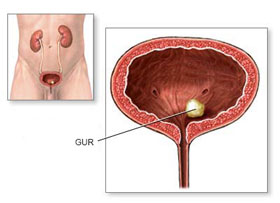Bladder Stones (Part One)
Definition

Bladder stones are hard masses of minerals, located in the bladder. Stones form when urine, staying long in the bladder, becomes concentrated allowing the crystallization of minerals. This stagnant and concentrated urine is often a result of the inability to completely empty the bladder.
Bladder stones do not always cause symptoms and may be discovered incidentally during examinations for other problems. When symptoms do appear, they can range from abdominal pain to the presence of blood in the urine. Small stones may pass on their own, but others need intervention. If left untreated, they can cause infections and other complications.
Symptoms
Some patients with bladder stones do not experience problems, even when they have large stones. However, if the stone irritates the bladder wall or blocks the flow of urine, then symptoms that appear include:
- Pain at the bottom of the abdomen
- In men, pain and discomfort in the penis
- Painful urination
- Frequent urination
- Difficulty urinating or interrupted flow
- Blood in the urine
- Urine that is cloudy or darker than usual
Causes
Bladder stones usually form when the bladder does not empty completely. The remaining urine in the bladder can form crystals that may create stones. In most cases, there are specific conditions that act on the bladder preventing it from emptying completely.
The most common conditions that influence the formation of bladder stones are:
- Enlargement of the prostate gland. An enlarged prostate or benign prostatic hyperplasia (BPH) can cause stones in men. As a result of the enlargement, the prostate can press on the urethra and interrupt the flow of urine, causing urine to remain in the bladder.
- Nerve damage (neurogenic bladder). Normally, nerves carry messages from the brain and relay them to the bladder muscles causing them to tighten or relax. If these nerves are damaged by a stroke or spinal cord injury, or other causes, the bladder may not empty completely.
- Inflammation. Stones in the bladder can form when the bladder is inflamed. Bladder inflammation can be caused by infections or medical radiation to the pelvis.
- Medical devices. Sometimes bladder catheters that are inserted into the bladder through the urethra to help urine flow, can cause stones. Contraceptive devices or stents that are accidentally inserted into the bladder can also cause stones. Mineral salts deposit on the surfaces of these devices, which later transform into stones.
- Kidney stones. Stones that form in the kidneys are not the same as those in the bladder. They develop in different ways and often from different causes. However, sometimes small kidney stones move down into the urinary bladder through the ureters and if they do not exit, they can grow to form bladder stones.
Predisposing Factors
In developing countries, bladder stones are common in children, often due to dehydration, infection, and a low-protein diet. In other parts of the world, they are more common in adults, especially in men over the age of 30.
Factors contributing to their formation include:
- Obstructions to bladder emptying. This refers to conditions that block the flow of urine from the bladder through the urethra (the canal that conveys urine from the bladder out of the body). There may be several conditions, but the most common is prostate enlargement.
- Neurogenic bladder. Cerebral hemorrhage and thrombosis, spinal cord injuries, Parkinson's disease, diabetes, disc hernia, and other diseases can damage the nerves that control the function of the urinary bladder. Some patients with a neurogenic bladder may also have an enlarged prostate or other bladder blockage issues which increase the risk of stone formation.
Hello, my father has an enlarged prostate and in the urinary bladder where he has a 1cm stone for many years
Sent by Arben Rroji , më 06 February 2019 në 05:26